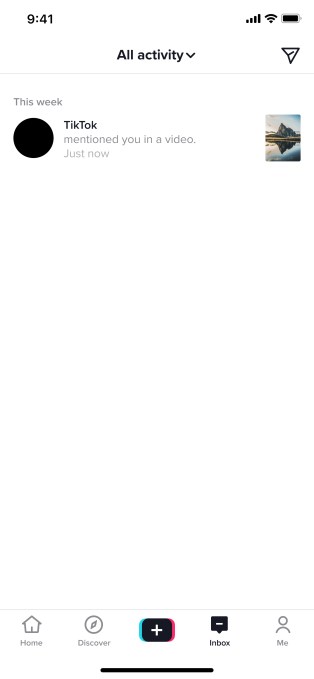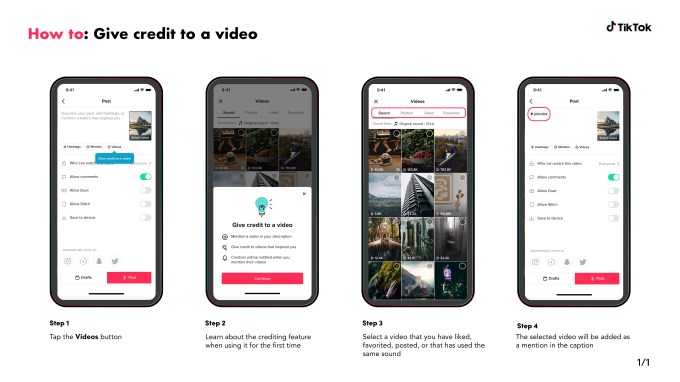After years of stolen memes and uncredited dance trends, TikTok today is introducing a new feature that it says will be the first iteration of its creator crediting tools that allow creators to directly tag and credit others using a new button during the publishing process. This button lets creators credit all sorts of inspiration for their content, including dances, jokes, viral sounds, and more — and will help TikTok viewers discover the original creators behind the latest trend by tapping on the credit from the video’s caption.
Larger creators lifting ideas from smaller ones is an issue that’s not limited to TikTok. But as one of the largest social apps on the market, particularly among a younger Gen Z to Millennial demographic, how it approaches the issue of creator recognition matters.
To that end, TikTok says it’s now rolling out a new feature that will allow users to add a credit as part of the publishing process on the app.
Image Credits: TikTok
To access the feature, users will tap on a new “video” icon on the posting page after creating or editing their own video. Once on the video page, users will be able to select a video they have liked, favorited, posted, or that had used the same sound.
After this video is selected, the video tag will be added as a mention in the caption.
Those whose videos were tagged by another creator will then be alerted to this via an alert in their TikTok app Inbox.

Image Credits: TikTok
The feature’s launch follows years of controversy over creator credits and attribution on TikTok.
In particular, TikTok had struggled with some of its top stars sourcing new choreography to perform in their dance videos from creators on other, smaller platforms — like the rival short-form video app Dubsmash, later acquired by Reddit. Many of these unknown creators had helped kick off TikTok’s biggest dance trends in years past, like the Renegade, Backpack Kid, or Shiggy. And many were creators of color, who saw their dances go viral after more famous TikTokers would perform their moves without tagging them as the inspiration. This issue came to a head when The New York Times in 2020 reported on the original creator of the Renegade, then a 14-year-old Atlanta teen, Jalaiah Harmon, who hadn’t received credit for her work after TikTok’s largest creator, Charli D’Amelio, performed her dance for her millions of fans, helping her to further grow her already outsized celebrity status.
The following year, a similar controversy made headlines after TikTok star Addison Rae went on “The Tonight Show” where she taught host Jimmy Fallon a number of popular TikTok dances. Meanwhile, the dances’ original creators, many of whom are Black, remained uncredited in the segment. Later, a number of Black creators went on strike as part of a viral campaign to call attention to the issue of creator credits by refusing to choreograph a dance to Megan Thee Stallion’s latest single.
D’Amelio and some other creators have since begun to handwrite dance credits in their video descriptions, often using the shorthand “dc” for dance credit followed by a tag pointing to the username of the creator. A famous Hollywood choreographer, JaQuel Knight, who made history as the first to copyright his work, has also begun helping other dancers on TikTok get credit for their work too, Vice reported in December.
But dances aren’t the only things being stolen on TikTok. Creators have fielded accusations of stealing everything from cheerleading routines to comedy bits to challenge ideas to music or sounds and much more.
A TikTok spokesperson acknowledged the problem with credits on the platform, noting that the culture of credit was “critical” for the community and for TikTok’s future. “Equitable creator amplification is important for creators, especially the BIPOC creator community,” they added.

Image Credits: TikTok
In an announcement, Director of the Creator Community at TikTok, Kudzi Chikumbu introduced the feature and highlighted other efforts the company has made to help better highlight original creator work on its platform.
Chikumbu pointed to TikTok’s Originators series, launched last October, which showcases trend originators through the app’s Discover List feature. TikTok also recently debuted a TikTok Originators monthly social series highlighting Originators on the platform. In addition, the TikTok Creator Portal includes a “Crediting Creators” section that highlights the importance of attributing trend originators for their work. Here, the company lays out best practices for crediting originators and explains how to find the originators if you aren’t sure who had started a trend.
The use of the new crediting tag could help make it easier for creators to cite their inspiration. However, it still relies on user adoption to work. If a creator wants to lift ideas without credit, they could simply not use the feature.
“It’s important to see a culture of credit take shape across the digital landscape and to support underrepresented creators in being properly credited and celebrated for their work,” said Chikumbu. “We’re eager to see how these new creator crediting tools inspire more creativity and encourage trend attribution across the global TikTok community.”

